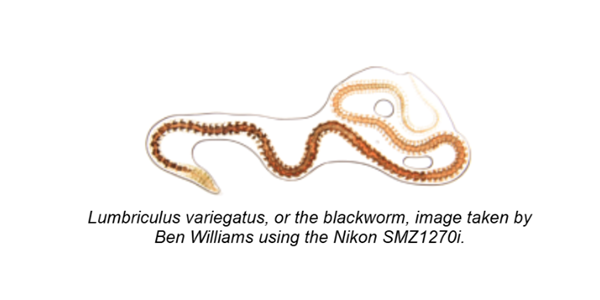It has become a recurring joke amongst regular attendees at Society meetings that whenever I show up, you are going to hear about something to do with worms!
Back in 2018, I sat in the office of the then Programme Director for BSc Medical Pharmacology programme,
Prof. Lisa Wallace, to discuss how we could get students to engage with
in vivo pharmacology without the use of conventional
in vivo experiments, such as gut bath experiments, which we saw to be both time and cost prohibitive when developing the new programme.
As such, we knew we would have to get inventive.
For reasons that are now a faded memory, we stumbled across the aquatic, regenerative and asexually reproducing worm
Lumbriculus variegatus, more commonly known as the blackworm.

Before long I had a small batch of these in an old plastic take-out container sitting in my office and, one afternoon, Lisa and I opted to slowly pour in some alcohol, a few drops at a time, to see if, like the conventional
C. elegans model used extensively in biomedical research
, our worms would get a bit boozy.
Soon, the worms swimming around slowed down and then were completely still. When we removed the alcohol, the worms started swimming around again. That was our
in vivo practical class sorted then – and in 2019, I delivered our first practical class using
L. variegatus to our inaugural Medical Pharmacology cohort and, unbeknownst at the time, this was the rather humble (and hairbrained!) beginning of the
Swansea Worm Integrative Research Laboratory (SWIRL). This would spiral into a multiyear project that would lead to me becoming known, informally, as “
that worm guy”.
SWIRL expanded from being a wacky idea of a practical class to a fully-fledged collaborative research group led by myself and Lisa, then subsequently joined by
Dr Nia Davies and
Dr Claire Price. In 2021, we published
our proof-of-concept paper on
L. variegatus as a model for pharmacological education, demonstrating its potential to provide students with hands-on experience. This was followed up with our 2023 paper detailing the development of
co-created practical classes using L. variegatus, in collaboration
Dr Margaret Cunningham at the University of Strathclyde, to enhance pharmacology education to promote experiential learning and
align with recommended curricula, providing a framework for using the model in practical classes. Since then, the use of
L. variegatus for providing hands-on
in vivo experience has been adopted by several colleagues at other higher education institutions.
In 2020, we welcomed our first MSc by Research student, Caitlin Bellamy, with Romessa Mahmood and Julanta Carriere following suit in 2021 and 2022, respectively. Ben Williams and Georgie Jomy joined in 2023 and, most recently, Megan Flanagan and Grace Labdon in 2024. During the same period, SWIRL has hosted thirty-eight undergraduate project students, five taught MSc students, seven internships, and even one BSc Biology (Year-in-Industry) student.
Within SWIRL, our students are not
allocated a project, but instead they can select compounds they are interested in for investigation and we, the academics, design a project around their interests. For example, Julanta, a self-confessed cannabi
nerd, was determined to investigate cannabinoids throughout her undergraduate degree. So, after completing her final year project in SWIRL, she began the initial investigations on the effects of cannabidiol (CBD) in
L. variegatus during her MSc, with her findings forming the basis of our 2025 paper on the
effects of CBD.
This co-creation approach allows students to develop their independence as a researcher – even if their drug(s) have no effect on our worms, negative data is still
good data when trying to understand these wonderful worms. It has also resulted in other publications such as our papers on the
effects of ethanol and
the effects of nicotine in
L. variegatus.
It would not be an understatement to say the British Pharmacological Society has been instrumental in SWIRL’s development. Initial funding from the
Society’s Education Grants allowed us to develop
L. variegatus as a teaching model, directly leading to our 2021 and 2023 papers.
Furthermore, through bursaries from the Society, we have been able to have SWIRL students present their findings at the annual Pharmacology conferences and the World Congress of Basic & Clinical Pharmacology (pictured below); not only enabling them to network with others in the field but allowing their development as independent scientists.

While it may be a cliché, the Principal Investigators of SWIRL are not the primary driving force behind the success of our group, we are simply facilitators of our students (and the ones who deal with the paperwork, grant writing and reviewers’ comments!)
The real successes of the group are driven by our students; they have invested countless hours in the lab, poking and prodding worms, coming up with new experimental techniques and optimising them, or at their desks analysing data, writing manuscripts, conference abstracts, and presentations, and fundamentally driving SWIRL forward. Our students have stated that they feel part of a team, fostering pride and community, further reinforced through SWIRL-branded ID card holders, notepads, USB sticks, pens and even hoodies! They say that SWIRL “provides an encouraging environment with staff, allowing us to develop as independent scientists and transition to working with, not for, our lecturers”.
While developing any new model or technique in science is challenging, it should still, fundamentally, be fun. Being a scientist is a privilege, as we get the potential opportunity to see something for the
first time – even if that is ‘just’ how a worm responds to a random drug!
Who would have thought some drunk worms in a take-out container would have led to this?
If you want to know more about these worms, I’m sure you’ll hear from me, or SWIRL, at the next Society conference!
Comments
If you are a British Pharmacological Society member, please
sign in to post comments.